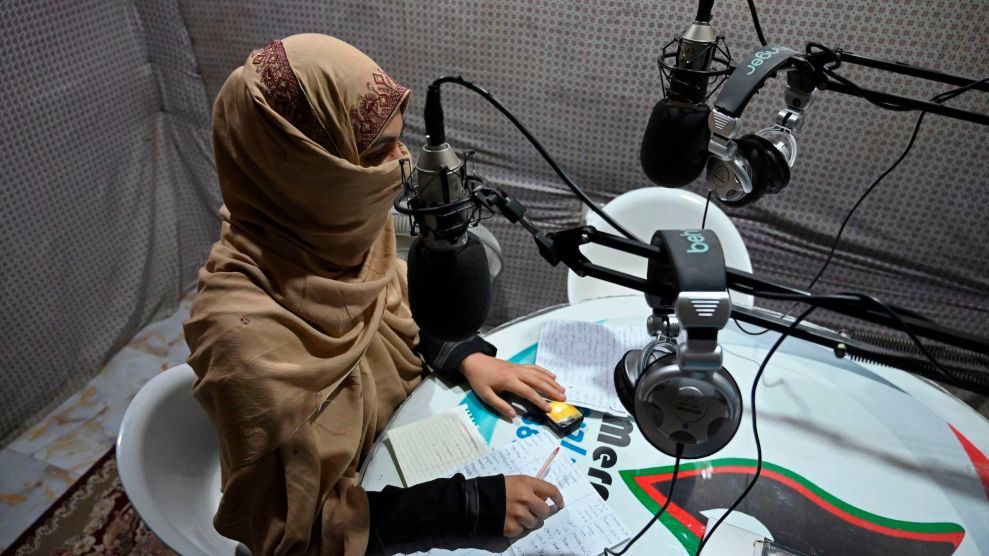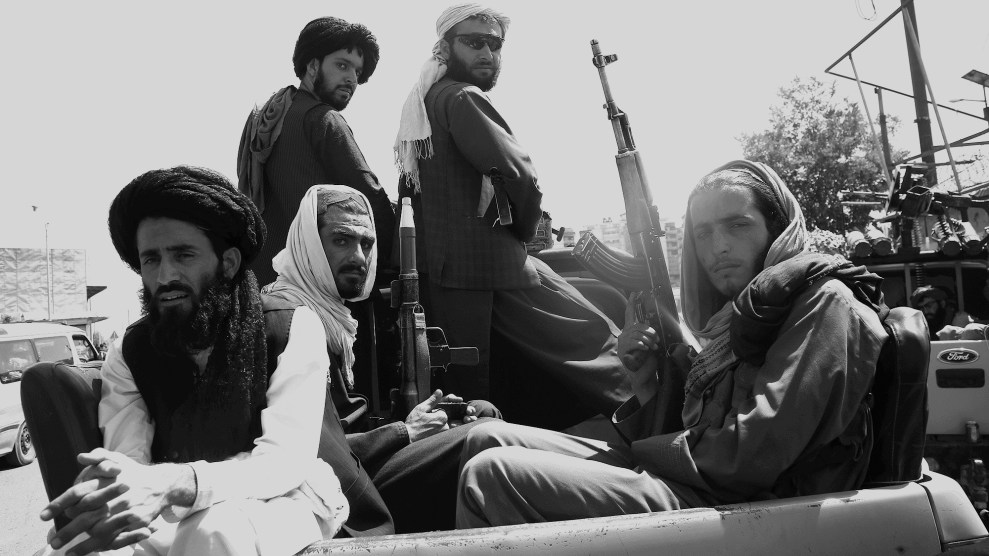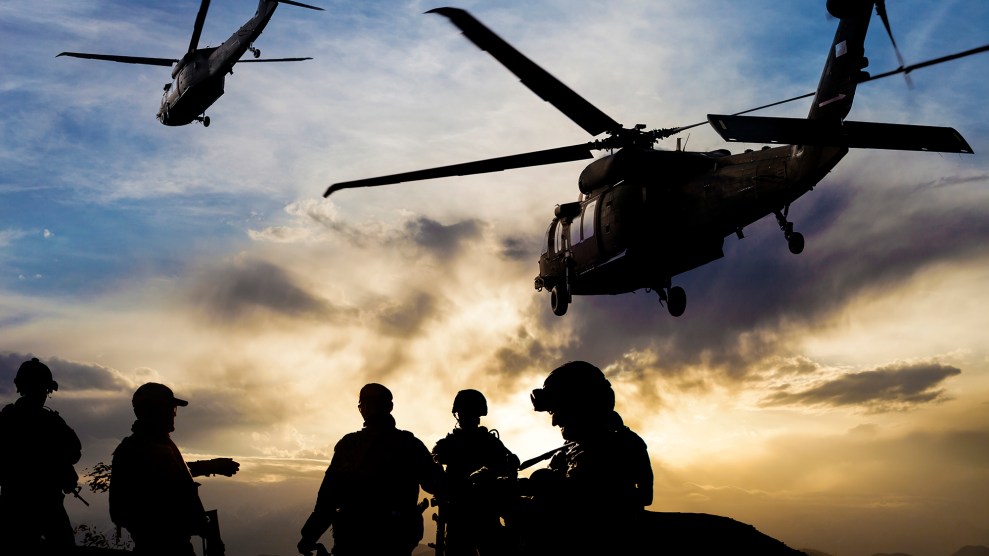
Wakil Kohsar/Getty
Four days after Taliban-controlled Kabul fell to the United States and its military allies in 2001, First Lady Laura Bush took over the mic for her husband’s customary weekly radio address. “The fight against terrorism is also a fight for the rights and dignity of women,” Bush declared. “Because of our recent military gains, in much of Afghanistan women are no longer imprisoned in their homes. They can listen to music and teach their daughters without fear of punishment.”
Rhetoric around women’s rights in Afghanistan, and portrayals of US military forces as saviors of Afghan women, have been used to justify the US war there from the beginning. Nine days after US bombs started dropping, Rep. Carolyn Maloney (D-N.Y.) donned a burqa on the House floor to declare the offensive a “just war, which we have no choice but to wage” while listing the Taliban’s many restrictions on women’s lives—no work, no school, no medical care from male doctors—and their devastating economic and health consequences. The same day as Bush’s address, the State Department published a report that concluded: “Today, with Kabul and other Afghan cities liberated from the Taliban, women are returning to their rightful place in Afghan society—the place they and their families choose to have.” The following week, the New York Times editorial board hopped on the train, praising the liberation of Afghan women as a “collateral benefit” of the war, and calling for women’s participation in civic life and government.
Now, 20 years later, as the Taliban retakes control of Kabul, Afghan women who heeded that call are poised to become some of the regime’s first victims. And US assistance for at-risk Afghan nationals, including journalists and women’s rights activists, is severely limited. “For some Afghan women activists, survival has become a matter of weeks—or days,” wrote Melanne Verveer, executive director of the Georgetown Institute for Women, Peace and Security, and Tayna Henderson, Mina’s List founder and executive director, in a Washington Post op-ed on Friday.
“I’m sitting here waiting for them to come,” Zarifa Ghafari, one of Afghanistan’s first female mayors, who has been targeted for death threats by the Taliban and others, told a British newspaper reporter over the weekend. “There is no one to help me or my family. I’m just sitting with them and my husband. And they will come for people like me and kill me.”
Fear now grips Afghan women with places of prominence in politics, media, and activism. In areas where the Taliban has already solidified control, commanders and fighters have engaged “in a pattern of threats, intimidation, and violence against members of the media,” Human Rights Watch wrote in report in April. Female radio and television journalists faced “particular threats,” the group reported, “targeted not only for issues they cover but also for challenging perceived social norms prohibiting women from being in a public role and working outside the home.” People who work in Afghan media are now scrambling to contact embassies for help while erasing as much physical and digital evidence of their existence as possible, one female journalist told the Guardian. “For many years, I worked as a journalist to raise the voice of Afghans, especially Afghan women, but now our identity is being destroyed and nothing has been done by us to deserve this,” another prominent female Afghan news anchor said. “In the last 24 hours, our lives have changed and we have been confined to our homes, and death threatens us at every moment.”
Some countries are offering a glimmer of hope for those women whose careers and public stature put them at greatest risk. On Saturday, Canada announced that it would expand its resettlement program for Afghans—not only those who contributed to Canada’s efforts in Afghanistan, but also “women leaders, human rights defenders, journalists, persecuted religious minorities, LGBTI individuals, and family members of previously resettled interpreters,” according to a government statement.
The United States, in contrast, is focused on airlifting out its citizens as well as those Afghans who worked in support of the US military. In a national address on Monday, President Joe Biden announced he has deployed 6,000 US troops “for the purpose of evacuating US and allied civilian personnel from Afghanistan, and to evacuate our Afghan allies and vulnerable Afghans.” The Afghan allies of whom Biden spoke are those who qualify for Special Immigrant Visas, which grants US resettlement to Afghans who worked as military interpreters or were otherwise employed by or on behalf of the US government. Yet of the over 300,000 Afghan civilians affiliated with the US military activities in Afghanistan, just 16,000 have receives SIVs since 2014, according to a report published this month International Rescue Committee.
As for Afghans who did not work for the US military or its affiliates, the Biden administration has extended refugee eligibility to those who worked for US-government funded programs, US-based media and nongovernmental organizations, as well as some of those who worked for the US government or its contractors but are not eligible for a Special Immigrant Visa. Yet as Verveer and Henderson pointed out in the Post, the US refugee program requires people to relocate to a third country before their cases can be processed, at their own expense—a nearly impossible proposition for Afghans right now: “Visas are difficult for Afghan women activists to come by in the best of times,” they wrote. “With the twin disasters of COVID-19 and war now raging across Afghanistan, most countries have ceased offering visas altogether.”
Verveer and Henderson called on the US government to charter evacuation flights for Afghan women activists facing imminent threats and to offer humanitarian parole—or temporary admission—to Afghan human rights defenders, women’s rights activists, politicians, journalists and others “being targeted for their refusal to conform to Taliban-dictated gender norms.” On Monday, the International Women’s Media Foundation issued a statement calling on “all governments worldwide to open their borders and include media workers in any humanitarian visa offerings available.”
“Right now, women journalists in Afghanistan are among the most at-risk populations in the country for reasons of revenge, retribution, and long-standing prejudice against their voices in any public arena,” the IWMF said in its statement. “With the Taliban targeting the press and the equality of women, the lives of these media workers are also among the most imperiled in the world.”
Taliban leaders have claimed their stance on women’s rights has changed—that women can have jobs and education consistent with Islamic law and Afghan cultural values. Yet in areas currently governed by the Taliban, Human Rights Watch says that few officials allow girls to attend school past puberty. A few weeks ago, in the Faryab province, the group reportedly burned a girls’ high school to the ground; when a local women’s rights activist wrote to them requesting they provide education, they threatened to kill her and her father. A report from Radio Free Europe/Radio Liberty last month said that in some rural areas in Afghanistan’s northeastern countryside, women have been forbidden from leaving their homes without a male escort. Some, it alleged, have been forced to marry fighters.
“It looks like I have to burn everything I achieved in 24 years of my life,” a university student wrote in the Guardian on Sunday. “Having any ID card or awards from the American University is risky now; even if we keep them, we are not able to use them. There are no jobs for us in Afghanistan. When the provinces collapsed one after another, I was thinking of my beautiful girlish dreams. My sisters and I could not sleep all night, remembering the stories my mother used to tell us about the Taliban era and the way they treated women.”
Rana Abdelhamid, a Justice Democrats–endorsed candidate currently challenging Maloney to represent New York’s 12th House district, wrote on Twitter Monday that after watching Maloney’s burqa speech in 2001, “I knew that as a Muslim woman my identity would be weaponized to justify American wars.” She called for bringing in more Afghan refugees, expediting their processing, and prioritizing their “family reunification.”
“We must be accountable to the crisis we helped create,” Abdelhamid wrote. “Anything less is unacceptable.”


















